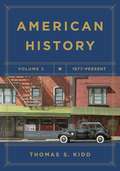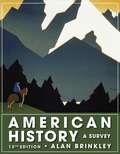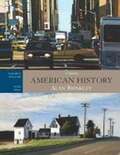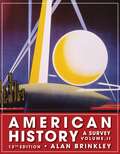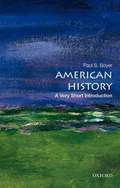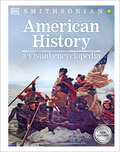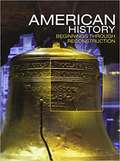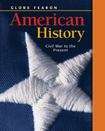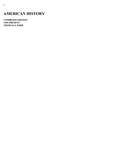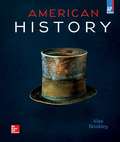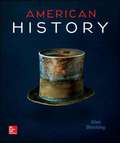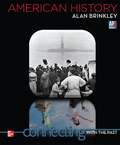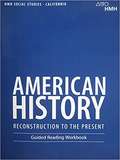- Table View
- List View
American History: 1877 - Present
by Thomas KiddAmerican History volume 2 gives a wide overview of America’s history from the end of the Civil War era, to the political and cultural struggles of contemporary times. Thomas S. Kidd employs lessons learned from his own scholarly expertise and history classes to weave together a compelling narrative of the defeats and triumphs that have defined the American national experience. Unlike many textbooks of modern American history, religion and faith remain central aspects of the book’s coverage, through present-day America. It gives detailed treatment of episodes such as America’s military conflicts, the Civil Rights movement, and the culture wars of the past half-century. Professor Kidd also considers the development of America’s obsession with entertainment, from the rise of the first movies, to the social media age. American History volume 2 will help students wrestle with the political and cultural changes that have dramatically transformed contemporary American life
American History: A Survey
by Alan BrinkleyHighly respected for its impeccable scholarship and elegant writing style, Alan Brinkley's American History provides students and instructors with a broad, comprehensive approach. to the American past. It offers not only a scrupulous account of American political and. diplomatic history, but also a deep exploration of the many other fields that are central to. a critical understanding of the nation's past: social, cultural, economic, and urban history,. histories of the South and the West, the environment, science and technology, race, ethnicity, gender, and the global context of the American experience.
American History: A Survey (10th edition)
by Alan BrinkleyHighly-respected for its impeccable scholarship and elegant writing style, American History: A Survey provides students and instructors with a comprehensive account of the American past in which no single approach or theme predominates. From its first edition, this text has included a scrupulous account of American political and diplomatic history. Today, however, the book explores areas of history such as social, cultural, urban, racial and ethnic history, more history of the West and South, environmental history, and the history of women and gender. In addition, American history has not evolved in a vacuum, but as part of a larger global world. The eleventh edition of this text places American history into that global context, making connections for students who live in an ever-expanding world themselves.
American History: A Survey (13th Edition)
by Alan BrinkleyApart from exploring America's political and diplomatic history, the author also sheds light on other areas critical for understanding the nation's past viz., social, cultural, economic, and urban.
American History: A Survey, Volume II (13th Edition)
by Alan BrinkleyHighly respected for its impeccable scholarship and elegant writing style, Alan Brinkley's American History provides students and instructors with a broad, comprehensive approach to the American past. It offers not only a scrupulous account of American political and diplomatic history, but also a deep exploration of the many other fields that are central to a critical understanding of the nation's past: social, cultural, economic, and urban history, including the histories of the South and the West, the environment,science and technology, race, ethnicity, gender, and the global context of the American experience.
American History: A Very Short Introduction
by Paul S. BoyerIn a miracle of concision, Paul S. Boyer provides a wide-ranging and authoritative history of America, capturing in a compact space the full story of our nation. Ranging from the earliest Native American settlers to the presidency of Barack Obama, this Very Short Introduction offers an illuminating account of politics, diplomacy, and war as well as the full spectrum of social, cultural, and scientific developments that shaped our country. Here is a masterful picture of America's achievements and failures, large-scale socio-historical forces, and pivotal events. Boyer sheds light on the colonial era, the Revolution and the birth of the new nation; slavery and the Civil War; Reconstruction and the Gilded Age; the Progressive era, the Roaring Twenties and the Great Depression; the two world wars and the Cold War that followed; right up to the tragedy of 9/11, the wars in Iraq and Afghanistan, and the epoch-making election of Barack Obama. Certain broad trends shape much of the narrative--immigration, urbanization, slavery, continental expansion, the global projection of U. S. power, the centrality of religion, the progression from an agrarian to an industrial to a post-industrial economic order. Yet in underscoring such large themes, Boyer also highlights the diversity of the American experience, the importance of individual actors, and the crucial role of race, ethnicity, gender, and social class in shaping the contours of specific groups within the nation's larger tapestry. And along the way, he touches upon the cultural milestones of American history, from Tom Paine's The Crisis to Allen Ginsberg's Howl. American History: A Very Short Introduction is a panoramic history of the United States, one that covers virtually every topic of importance--and yet can be read in a single day.
American History: A Visual Encyclopedia (DK Children's Visual Encyclopedias)
by DKUncover the key moments that shaped American history in this extensive history encyclopedia for children. This complete encyclopedia of American history showcases the incredible journey the United States of America has made to become the major 21st-century power it is today.American History: A Visual Encyclopedia is the ultimate reference tool for children aged 9+ to explore the history of one of the most remarkable nations in the world. Get the background on the Battle of Yorktown and discover what started the American Revolution. Learn the legends of the Wild West, and relive the atmosphere of the &“Roaring Twenties&”! This history encyclopedia covers everything from the cultures of the indigenous peoples of North America right up to the events of the present day. This ultimate US history encyclopedia for kids offers: A comprehensive reference guide that covers US history from the first peoples to the present day.Fully updated information and a fresh design in this new edition, featuring the Biden presidency, the coronavirus pandemic, climate change and environmental issues, and other recent historical events.More than 750 images providing a visual account of American History.Created in collaboration with the Smithsonian Institution, American History: A Visual Encyclopedia gives detailed historical information and brings it to life with more than 750 photographs and paintings, plus extensive maps, charts, and state-specific information. Each double-page feature focuses on one aspect of the Union&’s history, be it the Civil War or civil rights, the Great Depression or the Moon landing. Complete texts of the Declaration of Independence and the U.S. Constitution are included in this visual encyclopedia for easy reference classroom work or reports.
American History: Beginnings Through Reconstruction
by Robert Dallek Donna M. Ogle Jesus Garcia C. Frederick RisingerNIMAC-sourced textbook
American History: Beginnings Through Reconstruction
by Michael Stoff James DavidsonBy signing the Declaration of Independence, members of the Continental Congress sent a clear message to Britain that the American colonies were free and independent states. Starting with its preamble, the document spells out all the reasons the people of the United States have the right to break away from Britain.
American History: Beginnings Through Reconstruction (Tennessee)
by Robert Dallek Donna M. Ogle Jesus Garcia C. Frederick RisingerNIMAC-sourced textbook
American History: Beginnings through Reconstruction (Ohio)
by Robert Dallek Donna M. Ogle Jesus GarciaNIMAC-sourced textbook
American History: Beginnings to 1914
by Robert Dallek Donna M. Ogle Jesus GarciaNIMAC-sourced textbook
American History: Beginnings to 1914 (Michigan)
by Robert Dallek Donna M. Ogle Jesus Garcia C. Frederick RisingerHistory textbook for Middle School
American History: Civil War to the Present
by Globe FearonGeographers have developed five themes to show the connection between history and geography. These themes are location, place, region, movement, and human interaction.
American History: Combined Edition 1492 - Present
by Thomas S. KiddIn this combined edition, the full content of volumes 1 and 2 of Thomas Kidd’s American History are brought together in a single, accessible textbook. This sweeping narrative spans the full scope of American history from the first Native American societies to the political and cultural struggles of contemporary times. In clear, readable prose, and with attention to well-known and more obscure figures from American history, Kidd gives a robust account of the events, people, and ideas that gave shape to our nation.
American History: Connecting With The Past (Fifteenth Edition) (AP US History )
by Alan BrinkleyNIMAC-sourced textbook
American History: Connecting with the Past (Fiftteenth Edition) (Volume 2: From 1865)
by Alan BrinkleyThe latest iteration of Alan Brinkley’s American History, a comprehensive U.S. History program, transforms the learning experience through proven, adaptive technology helping students better grasp the issues of the past while providing instructors greater insight on student performance. Known for its clear, single voice and balanced scholarship, Brinkley asks students to think historically about the many forces shaping and re-shaping our dynamic history.
American History: Connecting with the Past, 15th AP Edition
by Alan BrinkleyAmerican History AP textbook
American History: Document Based Investigation Workbook (HMH Social Studies Series)
by Houghton Mifflin HarcourtA document-based investigation (DBI) requires you to use a source or a group of sources to produce a written response or some form of presentation. DBIs cannot be answered without a careful analysis of source materials. Unlike a math problem that you can work out in your head, finding the answer to a document-based investigation depends on the use of at least one outside reference. This workbook contains 19 activities. First you will study a collection of source materials and answer short questions about each one, using the writing space provided. The documents and questions will help you develop a response to the essay or presentation topic. In the second part of the activity, you will see a prompt to which you must provide a response. You must base your response on some or all of the source materials. The prompt is called the Task.
American History: Guided Reading Workbook (HMH Social Studies)
by Houghton Mifflin HarcourtHMH Social Studies: American History: Reconstruction to the Present: Guided Reading Workbook
